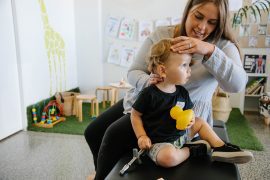An 18-month-old, or even a 3-year-old, is going to struggle with genuine empathy. They are often self-centred in a positive and wonderful way. But how does that phase end? Not by some magical delivery from fairies at around 5 or 6 or 8 or 9 years old. It happens slowly slowly. Even newborns react to a human face in distress. Day by day, piece by piece, a little brain changes and gets that others have feelings too.
Breastfeeding is a wonderful tool for teaching the skills that are at the heart of being a human.
When you say, “I don’t like it when you fiddle with my other breast”, you are helping to make a person who will form healthy relationships decades from now.
There are some practical tips that might help:
- You can tuck a piece of cloth or something textured into your clothing and encourage fiddling with that as an alternative.
- Offer a knitted breast, or even a silicone one.
- Move their hand to a different place with a gentle and repetitive phrase and be consistent.
- Let them say one ‘hello’ and then give them a choice about where the fiddling will continue: Do you want my bra clip or your nose? Do you want red flannel or shirt button?
Motherhood and parenthood feel like the lands of sacrifice. We are constantly absorbing the message that our feelings come second (or further down the line). If we have made a choice to continue with breastfeeding, we sometimes feel as though we have signed up to some sort of deal where we have to pretend it’s all wonderful. We’re not supposed to want to make restrictions. We’re betraying the God of natural-term breastfeeding if we do.
This is not true. If the nipple twiddling is uncomfortable for you, end it today. On a practical note, this means more oxytocin and more milk flow and an improved breastfeeding experience for all. It also means your mental health and the ability to see a breastfeeding session as a positive experience is elevated.
It could even extend your child’s opportunity for more days, weeks or months of feeding because you’ll be happier to continue.
If your toddler was poking you in the eye, you’d say ‘no thanks’. They might protest. They might get cross. You’d still say, ‘no thanks’. If they want to fiddle, there are infinite other options that give you agency over your other nipple. Toddler twiddling is not something you have to put up with because your feelings aren’t the priority.
Natural-term breastfeeding is about more than anti-bodies, protein, vitamin A or even comfort. It’s a world where you have a fast-track way to create a little human filled with empathy and kindness. Use that opportunity.
I’ve talked previously about the challenges of breastfeeding a toddler when you are staying at home more than usual and I have an article about stopping or restricting breastfeeding when you are feeding a toddler or pre-schooler.
Originally published here.
After a career as a Deputy Headteacher in central London, Emma initially trained with UK charity Association of Breastfeeding Mothers, qualifying as a breastfeeding counsellor with them in 2007. She qualified as a Board Certified Lactation Consultant (IBCLC) in 2011. She recertified in 2016 and continues to offer voluntary support at groups across West Haringey and volunteers on the National Breastfeeding Helpline and ABM national helpline alongside her private lactation consultant work. You can find her on Twitter as @makesmilk. Her book, “You’ve Got It In You: a positive guide to breastfeeding” can be found on Amazon and from other retailers.










